|
World War I turns a hundred this year. What was World War I? The war can be summarized briefly. The assassination of Archduke Franz Ferdinand set off a chain of interlocking alliances, leading to general war in Europe. Everyone thought it would be a quick war, one way or another, and they were all wrong. By the end of the war, Austria-Hungary and Russia had collapsed, and Germany would have likely joined them had they not thrown in the towel. France and Britain remained vaguely intact, or at least did not have a series of institutional collapses, but were badly mauled. Russia became the Soviet Union; Austria-Hungary became no particular world power; Germany... well, we know what happened to Germany. World War I saw a lot of technological innovations (tanks, aerial bombing, gas warfare) and upended both empires and a world-view. Millions died, tens of millions were maimed, and for the most part it didn't seem to be for much. The effects of the war kept going afterwards; the Weimar republic and its discontents are well known. Perhaps less famously, Allied forces would fight in the new-founded USSR. WWI is often neglected in American discourse, perhaps because America only joined the fighting in 1917. It is, of course, more important in the British Commonwealth nations, particularly in Australia and NZ, from what I know. The inspiration for this thread came from a discussion of recent attempts to rehabilitate the experience of WWI in the UK, as well as the reaction to that. I can't speak for this but I would welcome input from UK posters. So post your thoughts, your information and your hilarious propaganda posters (with translations, if relevant) about the Great War. Highlights will enter this OP. http://www.youtube.com/watch?v=UA730QtjOBE Some fine examples of Allied propaganda courtesy of Amused to Death: 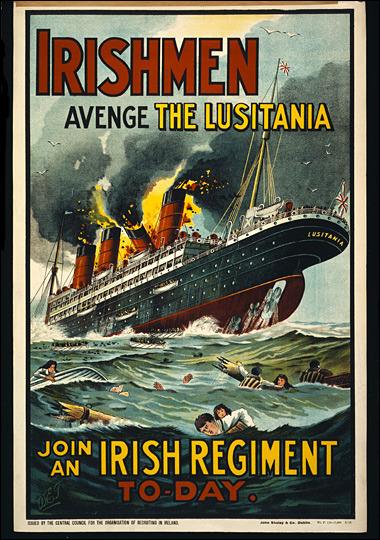 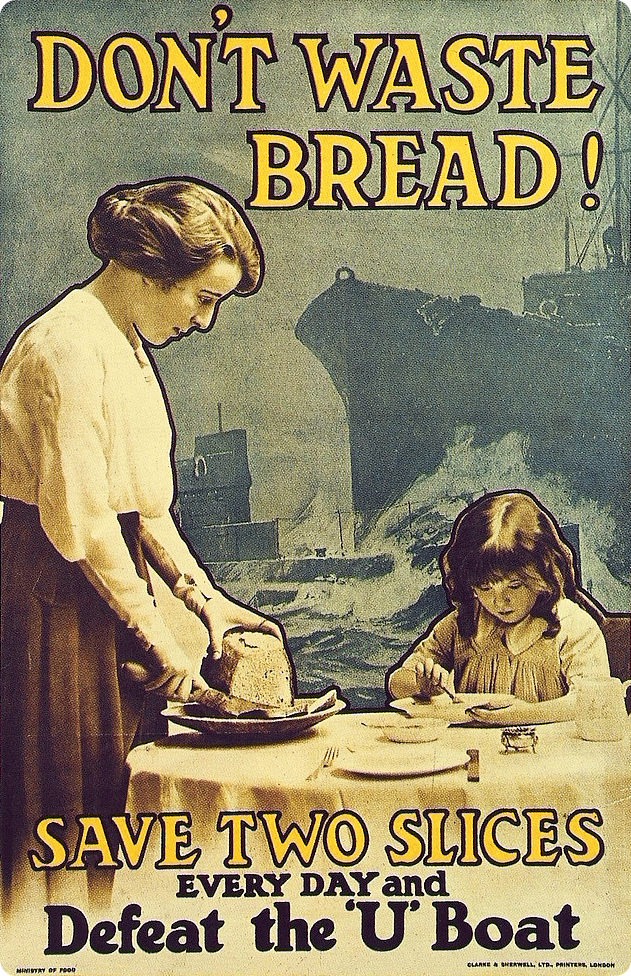 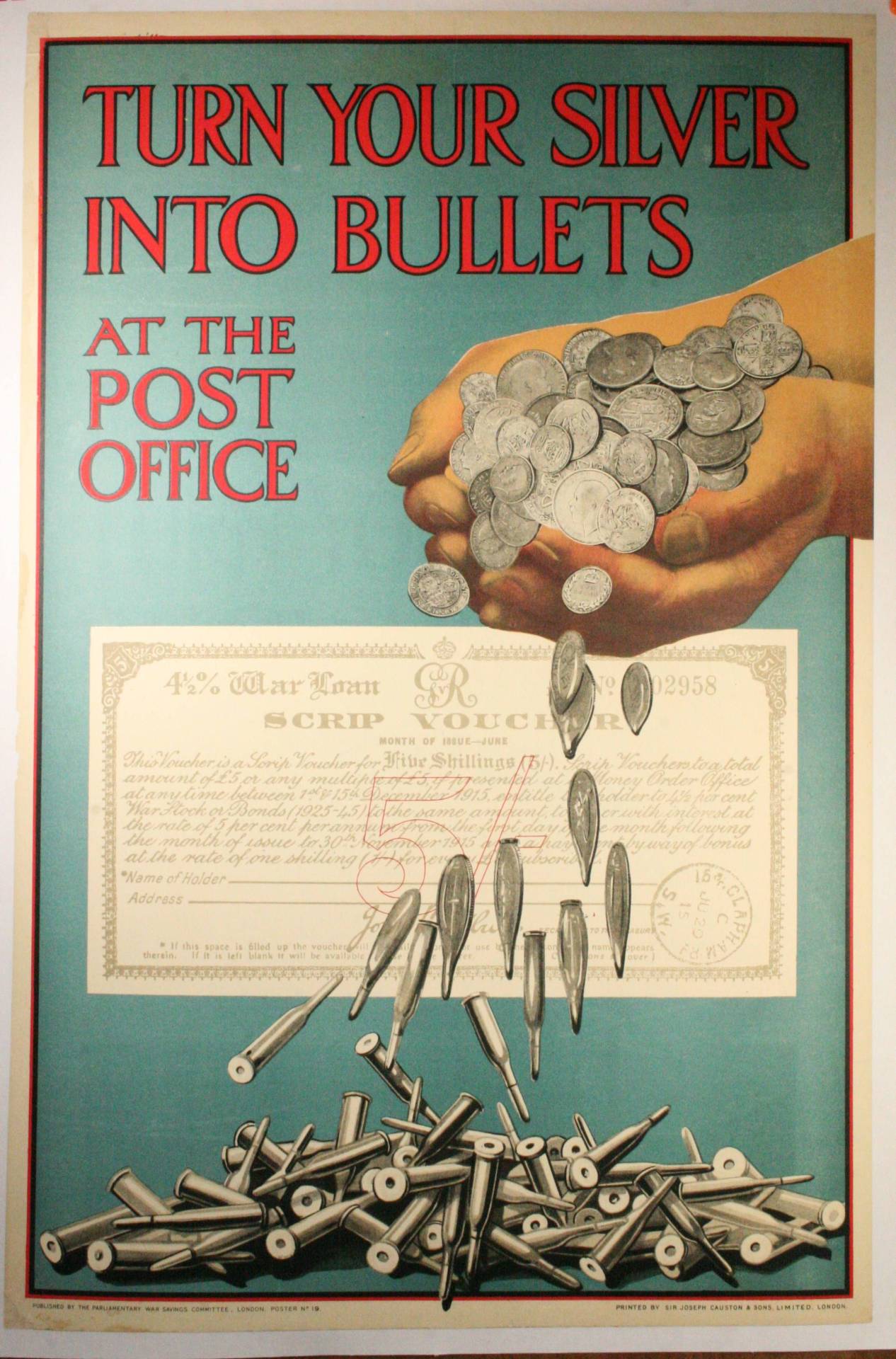 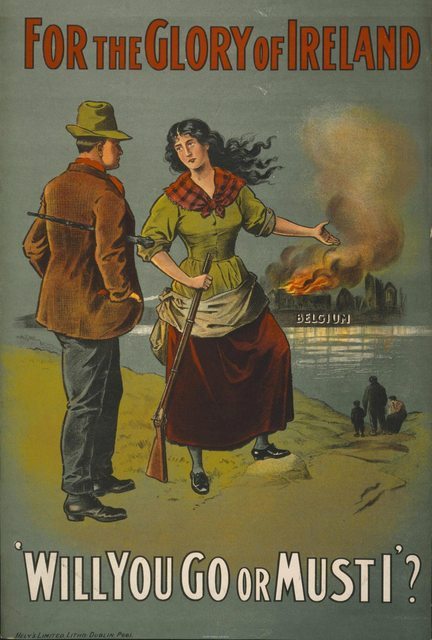 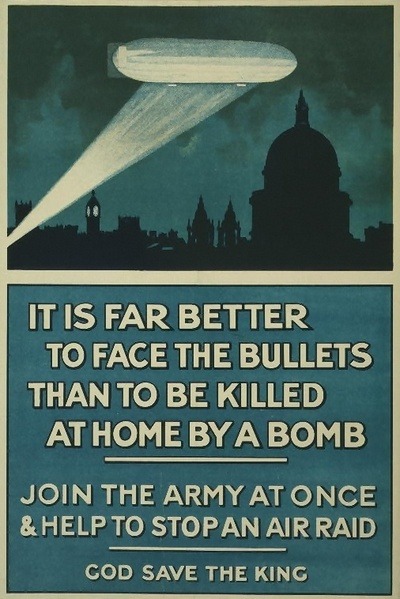 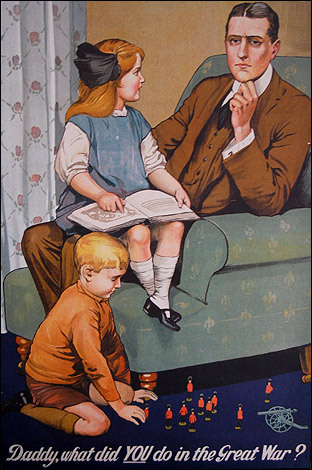 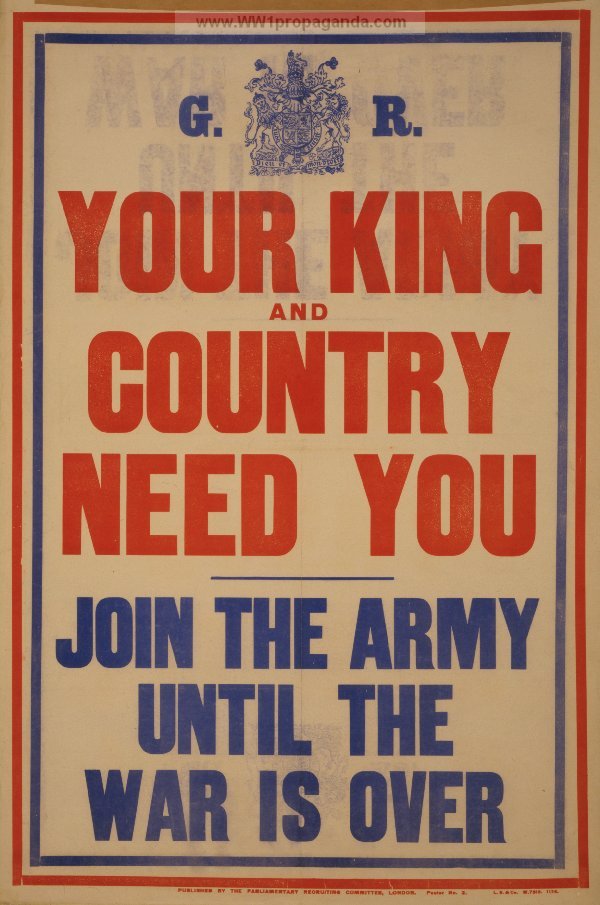 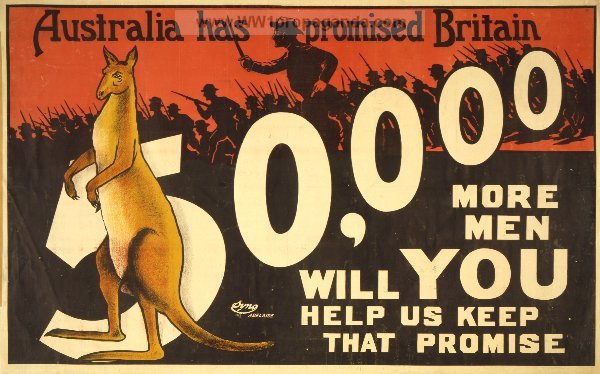 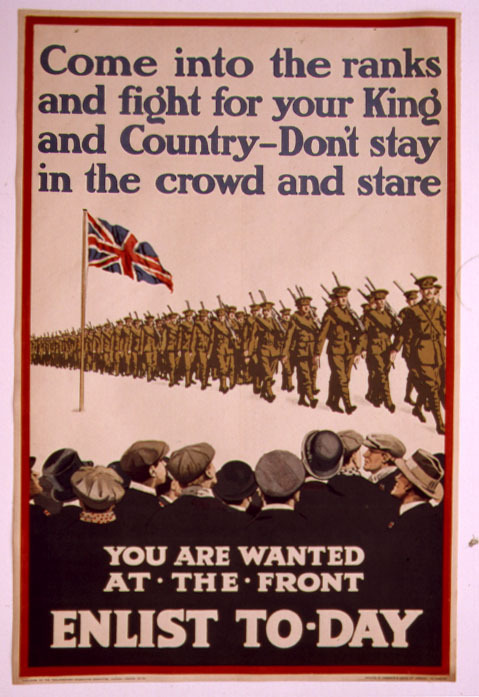 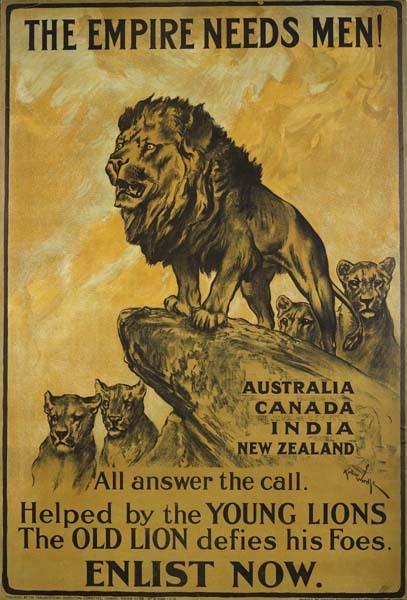  The Central Powers' counterargument: Captain_Maclaine posted:
Nessus fucked around with this message at 03:43 on Feb 14, 2014 |
|
|
|
|

|
| # ? Apr 18, 2024 01:39 |
|
Nessus posted:World War I turns a hundred this year. What was World War I? "The lamps are going out all over Europe. We shall not see them lit again in our lifetimes." I'd like to talk a bit about the July Crisis which got this whole thing rolling. This is the period in 1914 starting with the assassinations on Sarajevo of the Archduke and his wife, and concluding with the outbreak of hostilities in August. A common view is that the interlocking alliances by which the great powers had aligned themselves by the end of the Long 19th Century essentially guaranteed a war as soon as something like (Bismarck's anticipated "drat foolish thing in the Balkans") this came about. As A. J. P. Taylor put it, it would be "war by timetable," so rigid were war plans and mechanistic in how they brought mobilizations about, spurring other powers to mobilize in response, and so on and so on. John Keegan challenges this point in his history of the Great War, arguing that plans are just words on paper, and the disaster of the July Crisis could have been halted had statesmen had the sack to defy military advice and thus put the brakes on further escalation. Of the two, I find his the more convincing argument, both as I dislike arguments which remove human agency (which Taylor's seems to do) and also as I see evidence in the stop-gap maneuvering of British Foreign Minister Edward Grey and others towards mediating the (initially) Austro-Serbian conflict away from a larger war, which might have worked had it not been hamstrung by the backroom dealing of von Moltke telling the Austrians to strap up.
|
|
|
|
This is an interesting take on who's most culpable for starting the war, and shows the difference in perspectives: http://www.bbc.co.uk/news/magazine-26048324 All the British historians blame Germany/ Austria-Hungary/ Serbia, whilst the opposite contingent, from Istanbul and Germany, include Britain and France in the blame.
|
|
|
|
It's worth mentioning that Czar Nicholas II was a religious weirdo who thought everything he did was God's will GW Bush style. He managed to both ignore the advice of everyone who told him that pan-Slavism is nonsense and going to war over Serbia is suicide...but wasn't able to summon the authority over his generals who complained that generaling is hard and they didn't want to only mobilize against Austria. Nicholas even tried to cancel the general mobilization when Wilhelm promised peace if he did so...but his generals threw a tantrum over their shiny war being taken away and the Czar caved again.
|
|
|
VitalSigns posted:It's worth mentioning that Czar Nicholas II was a religious weirdo who thought everything he did was God's will GW Bush style. He managed to both ignore the advice of everyone who told him that pan-Slavism is nonsense and going to war over Serbia is suicide...but wasn't able to summon the authority over his generals who complained that generaling is hard and they didn't want to only mobilize against Austria. Nicholas even tried to cancel the general mobilization when Wilhelm promised peace if he did so...but his generals threw a tantrum over their shiny war being taken away and the Czar caved again.
|
|
|
|
|
VitalSigns posted:It's worth mentioning that Czar Nicholas II was a religious weirdo who thought everything he did was God's will GW Bush style. He managed to both ignore the advice of everyone who told him that pan-Slavism is nonsense and going to war over Serbia is suicide...but wasn't able to summon the authority over his generals who complained that generaling is hard and they didn't want to only mobilize against Austria. Nicholas even tried to cancel the general mobilization when Wilhelm promised peace if he did so...but his generals threw a tantrum over their shiny war being taken away and the Czar caved again. "Now you may smash your telephone." It also pays to remember that Europe in 1914 was in many ways an armed camp, due to the by then well established practice of universal male conscription (save in Britain, which maintained a professional army chiefly for colonial duty and counted more on the Royal Navy for national defense). This meant that while standing armies weren't always huge, they always had massive reserves that could be called up at fairly short notice. Or, to put it into more graphic terms:  Unrelated to that, a reminder that for all his many character flaws, the Kaiser was a sharp dressed fellow:  Diagnosis: Sassy! Nessus posted:I didn't know that; I usually heard about Nicolas II being led to perdition by Rasputin. Nicholas II wasn't a very capable ruler even by his own estimation, frankly. Rasputin did help accelerate the collapse of the dynasty by, well, being Rasputin and doing his thing, but Nicholas barely had what it took to manage the empire even in peacetime (and probably not even that).
|
|
|
|
Strange, I was taught it was the German generals who went into fits over MEIN ZEITPLANNEN
|
|
|
|
Forums Terrorist posted:Strange, I was taught it was the German generals who went into fits over MEIN ZEITPLANNEN Both did, as did Joffre in France who told Poincaré that every day lost in mobilizing would cost France something like 25 miles of national territory. M-Tag mania was pretty universal among the commanders the continental armies.
|
|
|
|
Looking forward to your livestream reading of The Guns of August, OP.
|
|
|
|
|
I blame the Serbs. Well, them and Russia. The Austro-Hungarian Empire and Germany also bear a lot of the burden given their aggressive demands made to Serbia following the assassination of Franz Ferdinand, employing military threats as opposed to diplomatic overtures. However I place more blame on Serbia and Russia for two reasons. The first was the connections between the Serbian military and the Serbian nationalist terrorist group Black Hand which carried out the assassination. Second Russia's military mobilization took only two weeks. This is important given the fact that Russia's military was, historically, notoriously slow to the point that Germany was prepared to attempt to deliver a knock-out punch to France with the majority of its army under the Schlieffen Plan before turning east to confront a mobilized Russian army. There's evidence that the Russians had prepared ahead of time for an outbreak of war, and given the time sensitive nature of conscripted armies being kept inactive in the field for extended period, it's likely they knew that their close ally Serbia would be making a move against its bitter enemy Austo-Hungry. This all starts to get rather conspiracy theory-ish, I realize, but for a subject that has no definitive answers this is my interpretation of the events that occurred. On the subject of just how devastating the war was for Europe, along with the sheer amount of misery it inflicted, was how brutally it smashed the 19th century romanticism of war when it was confronted with the war making capabilities of the 20th century. Darkman Fanpage fucked around with this message at 20:34 on Feb 13, 2014 |
|
|
|
Captain_Maclaine posted:Unrelated to that, a reminder that for all his many character flaws, the Kaiser was a sharp dressed fellow: Captain_Maclaine posted:Nicholas II wasn't a very capable ruler even by his own estimation, frankly. Rasputin did help accelerate the collapse of the dynasty by, well, being Rasputin and doing his thing, but Nicholas barely had what it took to manage the empire even in peacetime (and probably not even that). Heck, World War I wasn't even Nicholas' first spectacular military failure. In 1904 Russia was simultaneously purposely provoking Japan into a war, while failing utterly to prepare for Far East war in any way. And yeah, Nicholas wasn't Rasputin-crazy, but he was definitely GWB God-tells-me-what-to-do-in-my-heart-crazy. During Russia's brief flirtation with constitutional monarchy after the 1905 Revolution, Nicholas aggravated his Prime Minister to no end with poo poo like this. quote:Nicholas once returned a document unsigned with the note: "Despite most convincing arguments in favour of adopting a positive decision in this matter, an inner voice keeps on insisting more and more that I do not accept responsibility for it. So far my conscience has not deceived me. Therefore I intend in this case to follow its dictates. I know that you, too, believe that 'a Tsar's heart is in God's hands.' Let it be so. For all laws established by me I bear a great responsibility before God, and I am ready to answer for my decision at any time."
|
|
|
|
VitalSigns posted:I remember reading somewhere that there was a significant amount of homosexuality among the upper echelons of the manly Prussian manliness-worshipping elite generals. They loved being men, being around men, being inside men, etc. I haven't read anything on that, but it wouldn't surprise me much. Hell, the next time around the SS initially had problems with homosexual scandals for pretty much that reason. Gave Himmler fits, especially since he'd used "degeneracy" as part of his excuse to purge the SA. quote:Heck, World War I wasn't even Nicholas' first spectacular military failure. In 1904 Russia was simultaneously purposely provoking Japan into a war, while failing utterly to prepare for Far East war in any way. If I remember right, on the day the initial bread riots broke out in Petrograd, his diary entry was "went out for a nice walk, shot a bird" or something similarly trivial. Nicholas II never did have a solid grasp on what was actually going on in Russia, or indeed even his own capital.
|
|
|
|
VitalSigns posted:I remember reading somewhere that there was a significant amount of homosexuality among the upper echelons of the manly Prussian manliness-worshipping elite generals. They loved being men, being around men, being inside men, etc. Yeah, Nicholas II was hilariously incompetent. Hell, Tsarist Russia very nearly ceased to be in 1905 because of the Russo-Japanese war. Only reason Nicholas lasted as long as he did because of men like Witte, Stolypin, etc
|
|
|
|
How about some sweet allied propaganda from WW1          God save the king 
|
|
|
|
I can see why historians would blame Britain. They're entry into the war was rather foolish when you look at the facts. Britain and France had a defense agreement in word only. The two of them had signed the Entente Cordiale in 1904, ending the nearly thousand years of off and on conflicts between the two, so relations between them were lukewarm if anything. Britain's agreements with both France and Russia were shaky at best, and with the war being primarily a continental affair none of Britain's colonies were at risk. I think it most likely comes down to British fear of a more powerful Imperial Germany that brought it into the war, rather than any sort of obligation they felt towards France or Russia. Coupled with this was that once British generals got to France they treated their contemporaries with nothing but contempt.
Darkman Fanpage fucked around with this message at 20:47 on Feb 13, 2014 |
|
|
|
Darkman Fanpage posted:I can see why historians would blame Britain. They're entry into the war was rather foolish when you look at the facts. Britain and France had a defense agreement in word only. The two of them had signed the Entente Cordiale in 1904, ending the nearly thousand years of off and on conflicts between the two. Britain's agreements with both France and Russia were shaky at best, and with the war being primarily a continental affair none of Britain's colonies were at risk. I think it most likely comes down to British fear of a more powerful Imperial Germany that brought it into the war, rather than any sort of obligation they felt towards France or Russia. I thought Britain's main reason for entry into WW1 was their guaranteeing the independence and protection of Belgium? e: well, their de jure reason. Obviously de facto there may have been ulterior motives.
|
|
|
|
Amused to Death posted:I thought Britain's main reason for entry into WW1 was their guaranteeing the independence and protection of Belgium? Britain's main reason to convince the peace faction in Parliament to get off the fence, sure. e: beat by the edit.
|
|
|
|
Amused to Death posted:I thought Britain's main reason for entry into WW1 was their guaranteeing the independence and protection of Belgium? It's still a rather weak reason, I feel. I mean by the time the British Expeditionary Force reached mainland Europe the Germans had swept through Belgium and were into France, so at that point what difference did it make to the Belgians?
|
|
|
|
Amused to Death posted:I thought Britain's main reason for entry into WW1 was their guaranteeing the independence and protection of Belgium? Ah yes, because of early 20th Century Britain's strong belief in the independence and self-determination of militarily weaker peoples.
|
|
|
|
 Canada's great attempt to get First Nations people to join the CEF. Private Eye posted:This is an interesting take on who's most culpable for starting the war, and shows the difference in perspectives: To say that the historical debates surrounding the First World War were nationalistic is an understatement. There's been tons and tons of ink spilled on the subject. Even twenty years ago there was something like 25,000 books and scholarly articles on the subject.
|
|
|
|
I remember my high school history teacher insisting that the true cause of WWI was railway timetables. I assumed he was mostly being tongue in cheek, but I suppose he was referencing this book by AJ Taylor.
|
|
|
|
Darkman Fanpage posted:It's still a rather weak reason, I feel. I mean by the time the British Expeditionary Force reached mainland Europe the Germans had swept through Belgium and were into France, so at that point what difference did it make to the Belgians? The BEF's first battle is literally at Mons, Belgium. Belgium wasn't fully conquered until October 1914.
|
|
|
|
If I remember correction, one of the major reasons Britain intervened was through the fear of an unquestioned continental power, akin to Napoleon's France. If a single nation were to gain complete control over mainland Europe, it could easily threaten her overseas empire at a whim. If Germany smashed France a second time, it undoubtably would have become hegemon over Europe, if not beyond, depending on how the peace accords went.
|
|
|
colonel_korn posted:I remember my high school history teacher insisting that the true cause of WWI was railway timetables. I assumed he was mostly being tongue in cheek, but I suppose he was referencing this book by AJ Taylor.
|
|
|
|
|
Raskolnikov38 posted:The BEF's first battle is literally at Mons, Belgium. Belgium wasn't fully conquered until October 1914. A tiny sliver of Belgium was never conquered. This is the sector where the Belgian army remained for the entirety of the war.
|
|
|
|
Darkman Fanpage posted:I can see why historians would blame Britain. They're entry into the war was rather foolish when you look at the facts. Britain and France had a defense agreement in word only. The two of them had signed the Entente Cordiale in 1904, ending the nearly thousand years of off and on conflicts between the two, so relations between them were lukewarm if anything. Britain's agreements with both France and Russia were shaky at best, and with the war being primarily a continental affair none of Britain's colonies were at risk. I think it most likely comes down to British fear of a more powerful Imperial Germany that brought it into the war, rather than any sort of obligation they felt towards France or Russia. Coupled with this was that once British generals got to France they treated their contemporaries with nothing but contempt. In Castles of Steel, Massie gives a rather convincing reason for Britain entering the war: the Kaiser was building a navy that could credibly challenge the Royal Navy. Given that the British navy was their actual defense force against invasion, rather than their army, the British were paranoid as gently caress about the growing German navy. Then again, there was reason to be paranoid; though Wilhelm himself apparently didn't have any intention of ever fighting Britain, the events at Jutland suggest that a Germany with more time and resources (as could have come from a short and victorious ground war) could very well have defeated the British navy (with catastrophic results for Britain). Really, WWI exploded the notion of divine rule. The weakness and pride of the monarchs involved was very, very, very obviously the heart of the whole mess. Militarism compounded it, but strong rulers could have averted the catastrophe. They didn't. Today we just consider that to have been the odds catching up with the old monarchical system - but who knows what the world would look like today if the genetic and cultural dice had fallen slightly differently? It's almost unimaginable to modern sensibilities. That is the real legacy of WWI. Corbeau fucked around with this message at 21:40 on Feb 13, 2014 |
|
|
|
Dan Carlin's Hardcore History podcast is tackling World War 1 this year. It's pretty great, even though he updates very slowly. I imagine everybody reading this thread already knows about it but if you don't then you should check it out! e: you can find it on iTunes or at http://www.dancarlin.com/disp.php/hh
|
|
|
|
If you're really interested in this topic, I'd recommend the BBC's 26 part documentary about it, called "The Great War". It's all on Youtube, and they make some effort to be neutral, especially considering it was made in 1964.
|
|
|
|
Darkman Fanpage posted:I can see why historians would blame Britain. They're entry into the war was rather foolish when you look at the facts. Britain and France had a defense agreement in word only. The two of them had signed the Entente Cordiale in 1904, ending the nearly thousand years of off and on conflicts between the two, so relations between them were lukewarm if anything. Britain's agreements with both France and Russia were shaky at best, and with the war being primarily a continental affair none of Britain's colonies were at risk. I think it most likely comes down to British fear of a more powerful Imperial Germany that brought it into the war, rather than any sort of obligation they felt towards France or Russia. Coupled with this was that once British generals got to France they treated their contemporaries with nothing but contempt. People seem to forget that the German Navy was explicitly built to fight the Royal Navy. Splendid Isolation was dead and gone long before 1914. Any shift in the balance of power on the continent towards Germany would have in time led it into conflict with Britain (it already had in the Algier crisis). German historiography of the Kriegsschuldfrage is a lot more complex, too. For the longest time, it was considered the Kriegsschuldlüge - the idea that Germany, at best, carried the same amount of blame as any other involved country, and that the claim that Germany bore the sole fault for the war, as set down in the Treaty of Versailles, was a lie. Later, the German historian Fritz Fischer would write the book Griff nach der Weltmacht, which very convincingly argued that the German government very much wanted a war around 1915. Amongst others, there was a meeting of the Imperial War Council in 1912, which pointed out that the Russians would have finished an expansion of their rail network in Poland in 1916, which would throw the delicate time table of the Schlieffenplan out of whack. At the same time, the expansion of the canal between the North Sea and the Baltic would be finished in 1915, allowing Germany to easily shift naval forces between the two seas. All together it made a good argument that the German government, if it wanted a showdown with Russia and France, this was the time. I'm not saying that it was the sole deciding reason - the whole affair is far too complex for that - but it must have played a role. Obviously, modern day historians have shifted somewhat from that position and started to focus on the role of the other European powers, all of whom had reasons to want a war there and then. The French wanted to regain Alsace-Lorraine and wipe out the shame of 1870. The Austrians wanted to wipe out what they thought was the main source for the problems they faced with their Balkan peoples. The Russians wanted to save their fellow slavs. Britain, by comparison, was probably the country that least wanted this war.
|
|
|
|
Darkman Fanpage posted:I can see why historians would blame Britain. They're entry into the war was rather foolish when you look at the facts. Britain and France had a defense agreement in word only. The two of them had signed the Entente Cordiale in 1904, ending the nearly thousand years of off and on conflicts between the two, so relations between them were lukewarm if anything. Britain's agreements with both France and Russia were shaky at best, and with the war being primarily a continental affair none of Britain's colonies were at risk. I think it most likely comes down to British fear of a more powerful Imperial Germany that brought it into the war, rather than any sort of obligation they felt towards France or Russia. Coupled with this was that once British generals got to France they treated their contemporaries with nothing but contempt. So even though British diplomats were probably the only ones trying to work out a deal, and the war would have happened had Britain not got involved, Britain is to blame.
|
|
|
|
Konstantin posted:If you're really interested in this topic, I'd recommend the BBC's 26 part documentary about it, called "The Great War". It's all on Youtube, and they make some effort to be neutral, especially considering it was made in 1964. This is a good recommendation. It was the inspiration for (and, I believe, largely made by the same team who went on to produce ..) the multi-award winning THE WORLD AT WAR series, which pretty much set the bar for documentary film-making in the modern era. A brief warning. If you're genuinely interested in this era, you will find that a period reading up on one of the many many historical works written since 1918 (and this is, I believe, the most written-about war in human history), merely drags you into a never-ending motherlode of more and more interesting detail and perspective. The fascination for me is partly the military angle, that this was a completely new paradigm of warfare for which no participant was, or could really have been, prepared at all ... but also the fact that these 4 short years were really a crucible in which Western civilisation passed through a rubicon from one age into another which bore little or no resemblance to what came before. The social, philosophical, political and cultural changes which the conflict brought about pretty much formed the world we live in today. If you were transported in a time machine back to 1913, you'd find the world a very alien place in almost every way.
|
|
|
|
Soviet Space Dog posted:So even though British diplomats were probably the only ones trying to work out a deal, and the war would have happened had Britain not got involved, Britain is to blame. Wow, look at how I phrased that. It's almost like they were responsible in some way.
|
|
|
|
HCO Plumer GCB GCM posted:(and this is, I believe, the most written-about war in human history) It is slightly eclipsed by several orders of magnitude by WWII. Seriously, its not even a contest.
|
|
|
|
R. Mute posted:Britain didn't want the war - they just wanted all those dirty continentals to just accept their fate as second rate shitholes so that nothing could ever touch the glorious British Empire. Please explain how Germany or France or whatever were "second rate shitholes" and how Britain contributed to that and whatever that has to do with WWI
|
|
|
|
Panzeh posted:A tiny sliver of Belgium was never conquered. This is the sector where the Belgian army remained for the entirety of the war. So? Britain had a defense pact with Belgium since 1839, Belgium obviously didn't want to just let the Germans walk in and take over. It's not absurd for Britain to defend Belgium even if most of the country is occupied given the fact the end goal is to reverse the occupation.
|
|
|
|
Anyone interested in the origins of World War I should really check out Chris Clark's book "The Sleepwalkers", its probably one of the best history books I've ever read. His command of the sources he uses is incredible, you get a really intimate look at the decision making behind the different governments, the way that personal conflicts and bureacratic restructuring influenced the decade leading up to the war, the dynamics of the alliance system, the role played by imperial executives, and a whole lot more. Clark's familiarity with the internal documents and memos of the various great Powers is quite impressive. Its also nice because in contrast to most English language books on the origin of the war Clark dedicates most of his attention to the East and the Balkans (Barbara Tuchman's "Guns of August", by contrast, spends the majority of its time focusing on Britain).Darkman Fanpage posted:I can see why historians would blame Britain. They're entry into the war was rather foolish when you look at the facts. Britain and France had a defense agreement in word only. The two of them had signed the Entente Cordiale in 1904, ending the nearly thousand years of off and on conflicts between the two, so relations between them were lukewarm if anything. Britain's agreements with both France and Russia were shaky at best, and with the war being primarily a continental affair none of Britain's colonies were at risk. I think it most likely comes down to British fear of a more powerful Imperial Germany that brought it into the war, rather than any sort of obligation they felt towards France or Russia. Coupled with this was that once British generals got to France they treated their contemporaries with nothing but contempt. Who deserves to be blamed is a very tough question to answer, though I think Russia-Serbia-France end up looking pretty bad when you examine the situation. Still, each of the Power's took actions or had internal political disputes that contributed to the start of the war. The British were effectively using the entente as a way to defend their far flung imperial holdings. They were extremely concerned about the prospects of a Russian attack on India, a situation that would have put them into a very precarious position. They were also fairly concerned that a squabble with the French could be dangerous to their colonial interests in Africa and Asia. So developing links with those two powers, and keeping their aggression focused on the Central Powers, was, at least in the minds of the British (and especially Grey, who was quite anti-German) a very logical way to defend their imperial holdings without substantially increasing their military spending. Meanwhile the French were very worried about losing their Russian allies, who they feared might eventually reach some kind of accord with the Germans. The French were desperate to avoid a repeat of the Franco-Prussian War, and also hoped that they would eventually have the chance to take revenge for their previous defeat and regain Alsace-Lorraine (and, more generally, destroy German power once and for all, thus ensuring their own national security). The French were therefore very eager to support the Russians and ultimately judged that a war with Germany that occurred on two fronts was the least worst option compared to losing their alliance with Russia. As for the Russians, they had become increasingly interested in the Balkans following their defeat in the 1904 Russo-Japanese War. They'd effectively been cut off from any further expansion into Asia, so the Balkans represented their best prospects for expanding their territory and influence. The Russians were especially keen to gain control of Constantinople. The problem was that as the Ottoman Empire entered terminal decline and balkan states like Serbia, Bulgaria and Greece began gaining territory at the Ottoman's expense, the Russians got very anxious. There was a point during the Balkan Wars in 1912-1913 where it almost looked like the Bulgarians might conquer Constantinople, which the Russians really didn't want, especially since Bulgaria had increasingly been drifting toward the Central Powers' sphere of influence. To some members of the Czar's Council of Ministers the prospects of a European War were something to be looked forward to because they would have opened up the possibility of fully establishing Russian dominance over the Balkans and finally achieving control of the straits. For its part, Germany felt it had to support Austria Hungary since it had lost virtually every other Great Power ally (it was still technically aligned with Italy, but the Germans correctly anticipated that the Italians would prove to be fair weather friends). The Germans were also very worried about the pace of Russian industrialization, and there was a widespread (and largely incorrect, as it turned out) perception in Germany (and Europe generally) that military reforms following the 1904 Russian defeat had turned the Russian army into a formidable fighting machine that would only grow stronger over time. The Germans thought that the longer they waited the stronger the Russians would become, so perhaps a war with Russia in the short term would be preferable to waiting five or ten years until the Russian's were able to complete more railroads and ramp up their military capacity. Meanwhile Austria Hungary was facing what it recognized was an existential threat from ethnic nationalism and especially Pan Serbism. It didn't help that Serbia was fairly open about celebrating the death of the Archduke and essentially refused to investigate the murders. It also didn't help that the Black Hand was connected to senior figures within the Serbian military and government. The Austrians honestly had a fairly legitimate grievance against the Serbs but at that point in time there were no international mechanisms for sorting out those disputes, and the other Great Powers all read the conflict through the lens of their respective Great Power interests and therefore decided their positions toward Austria Hungary and Serbia based on their membership within the respective alliance blocs. The sad thing is that the war might have been avoided had the triggering event been delayed by a few years. The British weren't entirely happy in their understanding with Russia, there was going to be a general review of the compact in 1915 and there was a good chance that the British would have given up on their Russian appeasement strategy. In Russia the assassination of the reformer Stolypin and the removal of Kokovstov as Prime Minister had removed the main anti-war voices from the Russian cabinet. In Austria Hungary the Archduke Franz Ferdinand was ironically the main voice for peace and his murder laid the groundwork for exactly the sort of military adventurism that he had used all his influence to try and halt. Furthermore, Franz Ferdinand was widely recognized to be a reformer who might have turned Austria into the 'United States of Europe' by granting more autonomy to the major national groupings, and that might have ended up taking a lot of the wind out of the sails of Pan Serbist revanchism within the Empire (fear that these reforms might be successful may be part of the reason that the Black Hand targeted him).
|
|
|
|
My understanding of Wilhem II was that he was a paranoid bastard that thought the UK, France, and Italy were waiting to invade and take down the German Empire for whatever reason at any moment, which is why Germany armed itself to the teeth and why the Germany Navy was custom-built to take down the Royal Navy. I also read in A Book that he fancied himself as the "defender of the Teutonic/German people" because of his position in the German Empire, which is why he was so eager to help Austria and make sure that Serbia never got a chance to truly establish itself because he felt it was the first step in a pan-Slavic movement that would gently caress with German hegemony. How true are both of these?
|
|
|
|
Helsing posted:Chris Clark's book "The Sleepwalkers" Seconding this, Very good book. One of the better ones on WW1 I've read in a long time. If you have an hour and a half here's a public lecture Clark gave last year on the topic, well worth a listen if you don't mind rambling academics (you can skip the first 5 minutes or so): http://www.lse.ac.uk/newsAndMedia/videoAndAudio/channels/publicLecturesAndEvents/player.aspx?id=1712 Also, while I'm posting links to LSE public lectures, Dominic Lieven did an extensive one on Russia's role in the outbreak of WW1. It's massively detailed and based on new research he's carried out in the Russian archives, He was meant to be publishing a new book on Russia and WW1 but it hasn't surfaced yet: http://www.lse.ac.uk/newsAndMedia/videoAndAudio/channels/publicLecturesAndEvents/player.aspx?id=1733 kustomkarkommando fucked around with this message at 22:30 on Feb 13, 2014 |
|
|
|
ArchangeI posted:It is slightly eclipsed by several orders of magnitude by WWII. Seriously, its not even a contest. I'm not saying you're wrong for one second, but do you have any numbers to back this up ?
|
|
|
|

|
| # ? Apr 18, 2024 01:39 |
|
closeted republican posted:My understanding of Wilhem II was that he was a paranoid bastard that thought the UK, France, and Italy were waiting to invade and take down the German Empire for whatever reason at any moment, which is why Germany armed itself to the teeth and why the Germany Navy was custom-built to take down the Royal Navy. The first one, not so much. Willhelm desperately, desperately wanted to be friends with Britain. Ironically (or tragically), his way of achieving this was to build a massive fleet, which he figured would earn him the respect of the British. Then, Germany and Britain side by side would rule the world. That France would go to war if Germany ever showed weakness was a given of European politics at the time. HCO Plumer GCB GCM posted:I'm not saying you're wrong for one second, but do you have any numbers to back this up ? Without claiming it to be at all representative, a simple search on Amazon showed 75k results for "World War One" and 181k for "World War Two". Keep in mind that WWI is in the focus right now because of the anniversary, too. I'm sure someone with better access to publishing sources could give better numbers, especially for books that are no longer in print, but I'd be veryy surprised if the same trend doesn't hold true.
|
|
|































